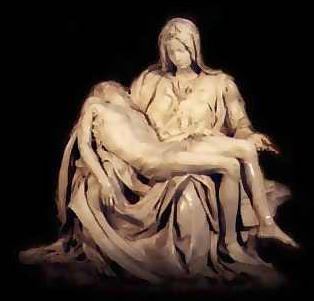
Q9: Is there any evidence in Scripture that Mary was indeed never actually subjected to original sin?
A: Yes. In Genesis 3:15, God said to Satan, "I will put enmities between thee and the woman... thou shalt lie in wait for her heel." The radical enmity between Satan and that second Eve, the Mother of Christ, forbids her having been under the dominion of Satan, as she would have been had she ever contracted original sin in actual fact. In Luke 1:28, we read how Angel was sent by God to salute Mary with the words, "Hail, full of grace." Grace exclude sin, and had there been any sin at all in Mary she could not have been declared to be filled with grace. The protestant version translates the phrase as "thou that hast been highly favoured." But the Greek certainly implies "completely filled with holiness." However, complaints that our doctrine exempts Mary from the contracting of original sin are becoming more and more rare in a world which is tending to deny original sin altogether, and which wishes to exempt everybody from it.
Q39: Why pray to Mary at all?
A: Because God wills that we should do so, and because such prayers to her are of the utmost value. God often wills to give certain favors only on condition that we go to some secondary agent. Sodom was to be spared through the intercession of Abraham (Genesis 18:20-33). Naaman, the leper, was to be cured only through the waters of the Jordan (2 Kings 5:9-14). Now Mary is, and must ever remain, the Mother of Christ. She still has a mother's rights and privileges, and is able to obtain for us many graces. But let us view things reasonably. if I desire to pray, I can certainly pray to God directly. Yet would you blame me if, at times, I were to ask my own earthly mother to pray for me also? Such a request is really a prayer to her that she may intercede for me with God. Certainly, if I met the mother of Christ on earth, I would ask her to pray for me, and she would do so. And in her more perfect state with Christ in Heaven she is more able to help me.
Q40: But a prayer to God directly must be more efficacious than a prayer to Mary.
A: Not necessarily. It might well be that God intends to honor Our Lady by granting the favor I seek through her intercession in a particular way. In that case the grace is to be given through her provided I honor her by addressing myself to her. Again, every prayer to Mary is in reality the asking of a favor also. It is often better to ask God for a favor and to have someone else praying to God with one for same favor. Two prayers are better than one. And above all, when the other one praying is Christ's own mother.
Q41: God loves you more than Mary loves you.
A: That is so. But He loves Mary more than He loves me. And as she is more pleasing to God than I am, He will be more ready to grant her requests.
Q42: It is unscriptural to attribute power to Mary.
A: That is a very unscriptural statement. At His mother's request Jesus changed water into wine at Cana, though He had said, "My time is not yet come" (John 2:4). St. James tells us that "the prayer of a just man availeth much" (James 5:16). How much more the prayer of Mary!
Q37: Did He not say to her at the marriage feast of Cana, "Woman, what is that to thee and to Me?" (John 2:4).
A: He did. But most certainly He intended no reproach to Mary. Her action was one of pure charity to others. Foreseeing the possible distress of others, she asked Him to relieve them; and He would not rebuke so unselfish a thought. Nor would He speak to her with any trace of disrespect. Then, too, had Mary asked a wrong thing, Christ would not have done it, nor would He have sanctioned a request He had to rebuke. And Mary knew that she had not been reprehended, or she would not have told the waiters to do what her Son would tell them. She would have dropped the matter. Why, then, did Christ speak thus? It was His first miracle, the first public sign of His divinity wrought by Himself. And He wanted to bring out publicly the fact that He was doing it, not as the son of an earthly mother and according to His human nature, but calling upon His divine nature as the eternal Son of God. He did it because His mother requested it, but He did not do it by any power derived from His mother. He thus brought out boths for the listeners and for us that this beginning of miracles was proof of His divinity, although in appearance He seemed but man.
<>< <>< <><
-- Adapted from Virgin and Statue Worship: Quizzes to A Street Preacher by Fr. Chas. M. Carty and Rev. Dr. Rumble. Order a copy of the booklet from: TAN BOOKS AND PUBLISHERS, INC., P.O. Box 424, Rockford, Illinois 61105.
No comments:
Post a Comment